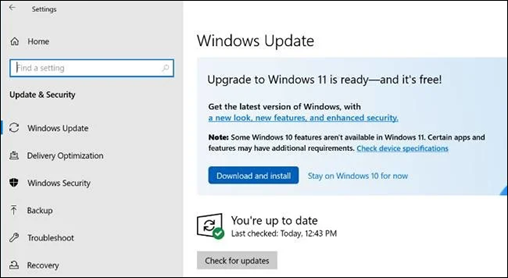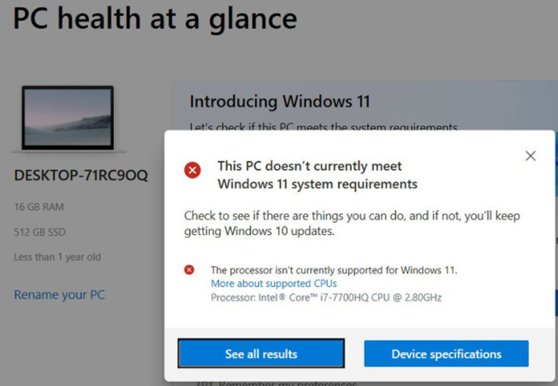Should you upgrade to Windows 11?
On the 5th October 2021, Microsoft quietly started rolling out Windows 11 in New Zealand - 6 years and 4 months after the release of Windows 10. You might have seen the notifications appear on your computer – but should you upgrade, or should you stick with Windows 10?
The good news is that there’s no rush, Windows 10 will continue to be supported until October 25th 2025 at this stage. If the notification pops up and you’d like to wait, all you have to do is click "Stay on Windows 10 for now." That click hides the upgrade option and removes the associated notification icon from the taskbar.

If you are considering upgrading, keep in mind that with such a big update, things can go wrong. Make sure you have been able to back up your data first and here are a few other cautionary considerations:
Your Computer May Not Support Windows 11
If your PC is brand new, it may have come with Windows 11 preinstalled. If so you can breathe a sign of relief as you'll be good to go.
However, for older PCs, there is a large number that won't be able to make the jump. The reasons get a bit technical, but it's all down to the hardware requirements for Windows 11. The biggest hurdle is the CPU compatibility requirement, which rules out most PCs that were designed before 2019. If your PC has a 7th Generation (or earlier) Intel CPU, chances are you won't be offered an upgrade at all.
It's possible that your computer will show you a message (like the image below) to let you know if you can't upgrade if the hardware is an issue. Alternatively, you're welcome to bring your computer to our Papamoa store where we can check this out for you.

Some Features You Use in Windows 10 May No Longer Be Available
Some people love the way Windows 10 works and they aren't happy about some aspects of the user experience that have changed in Windows 11.
For example, you can dock the Windows 10 taskbar at the top of the display or on either side, but the Windows 11 version is limited to the bottom of the display. The upgrade also removes your ability to drag a file or app icon onto the taskbar and have it pinned as a shortcut and to organize Start menu shortcuts into folders.
There's a lengthy list of features removed or deprecated in Windows 11. If anything on that list is a must-have item for you, consider postponing the upgrade. Check out this Windows 11 'Cheat Sheet' article written up by ComputerWorld for more info on the differences.
Of course, this factor works in reverse, too. There are a number of improvements mentioned in the above Cheat Sheet which serve to help the user experience.
Your Software May No Longer Work With Windows 11
Because Windows 11 is mainly a big feature upgrade to Windows 10, most devices and apps that are compatible with Windows 10 should work after the upgrade. However, there are definitely some older apps (and devices like printers) that are no longer working after the upgrade and we've come across this a number of times with clients who have upgraded.
If you know you're running old connected devices or software then it would pay to be ready to look at alternatives, or delay upgrading if it looks like there will be issues. If you run into a post-upgrade compatibility issue, rolling back to Windows 10 is always an option, but your best course of action is to avoid that necessity by testing thoroughly first.
Getting help
Don't feel you have to go it alone, the last thing you want is to accidentally delete precious data if something goes wrong. We can take care of this step for you, either backing up your data and helping you with the upgrade or helping you look at other options if your computer isn't eligible for an upgrade.
If you're unsure or would like to learn more, please don't hesitate to give us a call and we will be happy to give you some advice.
